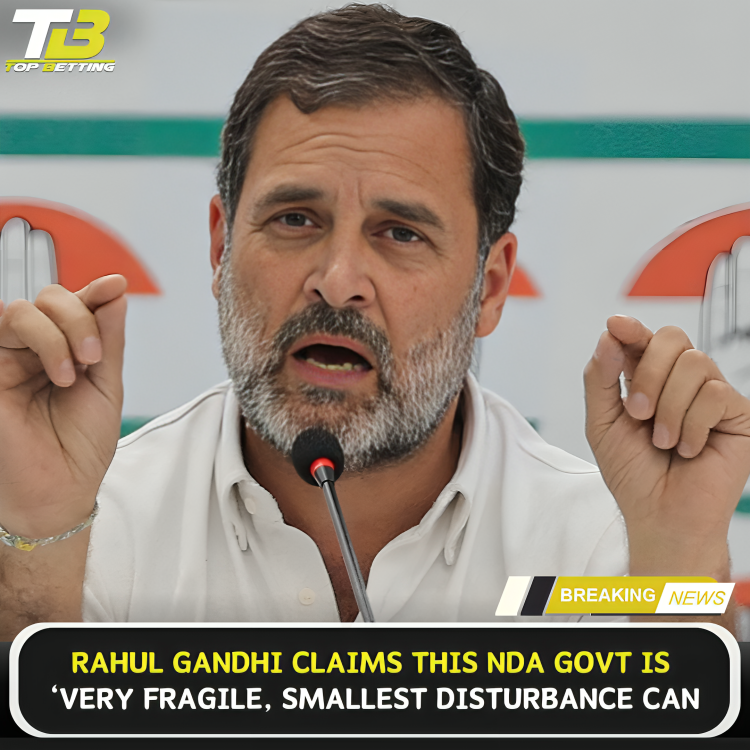
Rahul claims this NDA govt is very fragile
Rahul Gandhi’s recent assertion that the NDA government is on shaky ground has brought the spotlight on the perceived fragility of the ruling alliance. The government’s ability to navigate through challenges such as the farmers’ protests and the COVID-19 crisis has been called into question. The dynamics within the NDA coalition and its response to internal and external pressures are being closely scrutinized.
The term ‘fragile’ used by Gandhi implies a delicate balance that could be easily disrupted. It raises concerns about the government’s resilience in the face of adversity. As the nation grapples with economic uncertainties and social unrest, the stability of the ruling dispensation becomes a subject of intense debate. The coming months will be crucial in determining the veracity of Gandhi’s claims.
It is essential to delve deeper into the factors contributing to this perceived fragility. The NDA’s handling of key policy issues, its relationship with coalition partners, and the public perception of its governance are all crucial aspects that need to be examined. The upcoming state elections will serve as a litmus test for the government’s strength and popular support.
Instances Supporting Rahul Gandhi’s Claim
Several recent events have lent credence to Rahul Gandhi’s assertion regarding the fragility of the NDA government. The farmers’ protests, which have garnered widespread attention and support, have exposed divisions within the ruling coalition. The government’s initial handling of the protests and subsequent attempts to quell dissent have been viewed as signs of vulnerability.
Moreover, the management of the COVID-19 pandemic has been a major point of contention. Criticisms regarding the lack of preparedness, inadequate healthcare infrastructure, and the economic impact of the pandemic have raised doubts about the government’s ability to effectively address crises. These instances have provided ammunition for those questioning the stability of the ruling alliance.
The NDA’s response to dissenting voices, both within and outside the coalition, has also been under scrutiny. The manner in which the government deals with internal conflicts and differing opinions reflects its capacity to withstand challenges. Rahul Gandhi’s claim gains traction when viewed against the backdrop of these incidents that have tested the government’s mettle.
Criticisms and Counterarguments Against Rahul Gandhi’s Claim
While Rahul Gandhi’s characterization of the NDA government as fragile has resonated with some quarters, there are critics who view his statement as mere political posturing. The opposition has often been accused of exaggerating flaws in the ruling dispensation for electoral gains. Critics argue that the government’s track record of policy implementation and economic reforms speaks otherwise.
Proponents of the government contend that the NDA has weathered numerous storms since coming to power and has demonstrated resilience in the face of challenges. They point to the successful passage of key legislation and the implementation of reforms across various sectors as evidence of a stable governance framework. The government’s proactive measures in addressing national security concerns also receive praise.
Moreover, the NDA’s ability to maintain a united front despite differing ideologies among coalition partners is seen as a strength rather than a weakness. The government’s commitment to consensus-building and dialogue is highlighted as a key factor in ensuring its stability. While acknowledging areas of improvement, proponents of the government argue against labeling it as fragile.
Impact of a Fragile Government on the Nation
The implications of a fragile government extend beyond the political realm and have far-reaching consequences for the nation as a whole. Political instability can lead to policy paralysis, uncertainty in decision-making, and a lack of long-term planning. This, in turn, can hamper economic growth, deter foreign investments, and erode public trust in institutions.
A government perceived as fragile may struggle to effectively address pressing issues such as unemployment, poverty, and healthcare. The credibility of governance institutions may come under question, leading to a decline in public confidence. Social unrest and protests could escalate if the government fails to provide timely and effective solutions to the challenges facing the country.
Furthermore, a fragile government may find it challenging to forge strong international relationships and represent the nation effectively on the global stage. Diplomatic efforts, trade negotiations, and strategic alliances could be jeopardized if the government is perceived as weak and unstable. The impact of political fragility on national security cannot be overlooked, with potential threats being magnified in such a scenario.
Possible Consequences of a Fragile Government
The repercussions of a fragile government can manifest in various forms, affecting different sectors of society. Economic instability, characterized by fluctuating markets and investor uncertainty, could hinder growth and development. The lack of a clear policy direction and consistent decision-making could lead to a climate of unpredictability, deterring both domestic and foreign investments.
Social cohesion may be strained as a result of political uncertainty, with divisions deepening along ideological lines. Public discontent and disillusionment with the government’s ability to address pressing issues could fuel unrest and protests. The erosion of trust in democratic institutions may have long-term implications for the functioning of a pluralistic society.
Conclusion and Future Implications

In conclusion, Rahul Gandhi’s claim that the NDA government is fragile has opened up a debate on the stability and effectiveness of the ruling alliance. The coming months will be critical in determining the veracity of his assertion, as the government grapples with internal dissent and external pressures. The impact of political fragility on governance, public trust, and national security cannot be underestimated.










